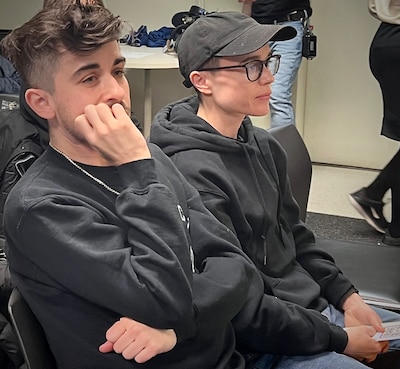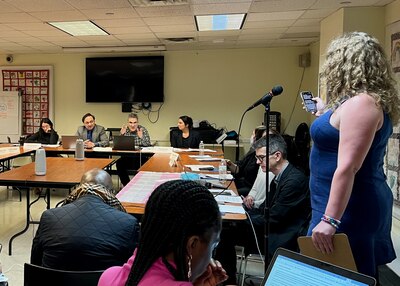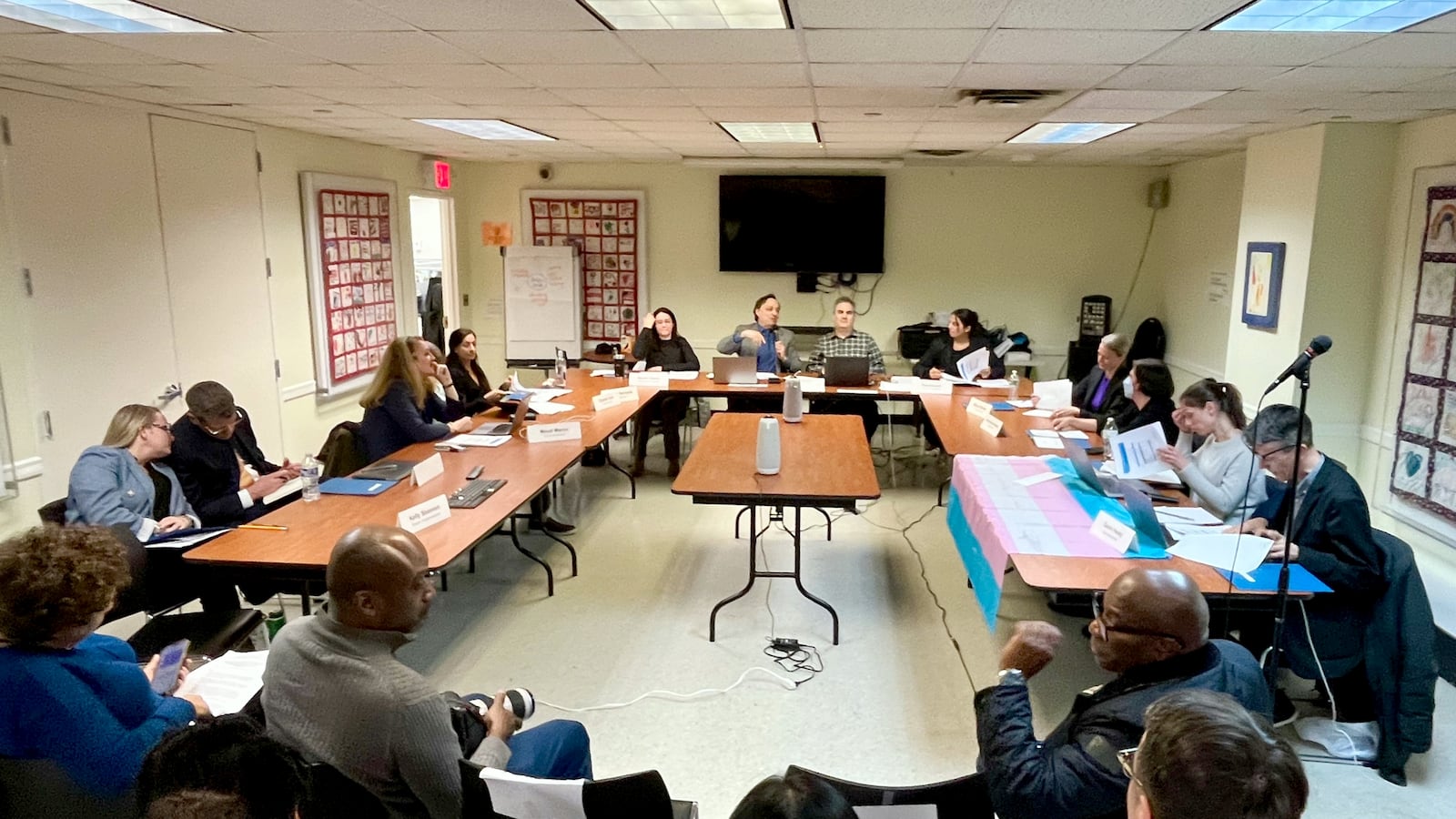Rebeca moved to New York City a year ago to protect her daughter, now 8, from increasingly trans-restrictive laws in Florida.
So it came as a shock when she received a 7 a.m. text from a parent at her children’s school on March 21. A Manhattan parent-led advisory board had voted 8-3 the night before calling on the Department of Education to revisit guidelines on trans girls’ sports participation.
Rebeca — who asked that we use only her first name and a pseudonym, Sophie, for her daughter, who is transgender — had thought of herself as a political refugee from a state where each legislative session threatened her daughter’s identity.
“It’s very triggering just to see the rhetoric so close,” she said of the largely symbolic resolution passed by the Community Education Council, or CEC, in Manhattan’s District 2, the second largest of the city’s 32 local districts.
NYC schools Chancellor David Banks made it clear that he did not support the CEC’s resolution. But for Rebeca, whose daughter attends school in a nearby district, and other trans youth and allies, the resolution marked a troubling first for New York City, and old fears were awakened.
“You get scared to talk to anybody, because you don’t know if somebody’s supportive or not,” Rebeca says. “Once the rhetoric is there, it’s not just sports, soon it’s bathrooms, soon it’s curriculum.”
The parents who passed the resolution claimed they were seeking to open a dialogue, but many of them are part of or endorsed by PLACE NYC, or Parent Leaders for Accelerated Curriculum and Education, a group seen as pushing a pro-screened school and anti-integration agenda. Additionally, Maud Maron, the resolution’s lead sponsor and co-founder of PLACE, has made anti-trans comments.
Last week, Maron received a letter from the Education Department, following an investigation under a new process to address parent leader misconduct allegations, that instructed her to “cease engaging in conduct involving derogatory or offensive comments about any New York City Public School student,” or face suspension or removal from the CEC, as first reported in The 74.
Some experts worry that the resolution itself, even though it’s only advisory, will have a negative impact on trans youth who already experience bullying and harassment.
“I’m a little emotional because this is my community once again being attacked by individuals who have zero idea what it’s like to walk in my very high heels,” Athena Rivera, a trans teen who is a member of the city’s Panel for Educational Policy, said at a recent meeting of the citywide board. “I find it utterly appalling that we still today have grown adults making anti-trans or bigoted proposals.”
Tension between NY laws and parent rhetoric
New York state education law prohibits discrimination in physical education classes and athletics, a fact raised repeatedly by speakers at March’s Community Education Council meeting. But the resolution’s co-sponsor was undeterred.
“A lot of our resolutions, whether it’s on issues related to social issues or educational issues, are all geared towards putting parents more front and center,” said Leonard Silverman, who is CEC 2′s president.

His views echo proponents of parents’ rights bills nationwide that limit educators’ ability to teach about race, gender, and sexuality. PEN America reports that nearly 400 “education intimidation” bills were introduced between January 2021 and June 2023, and 39 are now law.
As of last summer, 23 states had passed laws excluding trans youth from participating in the sport that aligns with their gender, according to ESPN.
“We know that hostile legislation undermines LGBTQ+ young people’s well-being and puts them at higher risk of harassment, so there are good reasons to believe this resolution alone has negatively impacted NYC trans youth,” said Jennifer Jennings, a District 2 resident and Princeton University professor currently teaching a course titled “Schooled: Education, Opportunity, and Inequality.”
Education Department officials said the District 2 CEC resolution would be rejected, and the city does not intend to revise the guidelines. At the March Panel for Educational Policy meeting, held on the same night CEC 2 approved the resolution, Banks condemned the misinformation in the resolution and its intent to target trans youth.
“It’s especially troubling because we know sports build a sense of self-confidence and belonging,” said Banks. “Rather than excluding our trans students, we ought to be working together to wrap our arms around them. They need our love and encouragement, and support, not political attacks.”
Still, despite the Education Department’s assurances, Oliver Duffy, a District 2 seventh grader, said what happens in these meetings could have ramifications across the city.
He and his peers were talking about the CEC’s rhetoric even before the vote. In January, Duffy wrote CEC 2 members a letter after some of their anti-trans internal chat messages leaked to The 74. The messages were particularly upsetting to him, he said.
Maron has become a polarizing figure: At Stuyvesant High School, where Maron is on the Student Leadership Team, a student started a petition asking for her removal. The petition expresses concern that Maron will “alter school policies in more subtle ways that may prove detrimental to students of color and LGBTQ+ students.”
“I wanted the CEC to know that their words have impact,” said Duffy, who started a Gender and Sexuality Alliance, or GSA, in his elementary school. “Maud tweets a lot of anti-trans stuff on social media, which kind of sometimes influences kids. And a lot of kids see it, and it just makes them feel more bad about themselves.”
When asked on last year’s NYC School Survey whether or not students harass, bully, or intimidate each other because of their gender, gender identity, or gender expression, 34% of the students citywide in grades 6-12 who participated said this happens some or most of the time.
Of the 41 students who identified as nonbinary, gender fluid, or gender expansive who took the survey, 66% reported seeing this behavior in their schools.
Tamuira Reid, Duffy’s parent, sees the resolution as an opportunity to strengthen the Education Department’s guidelines on gender inclusion – not just to see whether or not trans and nonbinary students feel safe going out for the sport of their choice, but to ask, “Does every school have a GSA? Does the staff there have the funding to run the programs that actually affirm and keep kids safe?”

Though supporters of District 2′s resolution said it wasn’t anti-trans, Maron, also a member of the far-right parent organization Moms For Liberty, has made it clear she would exclude trans girls from playing the sport that aligns with their gender. “When you say trans girl, what you’re talking about is boys,” Maron told Chalkbeat. But Maron said her positions are distinct from the resolution. “My personal opinions and the resolution are two separate things,” she said.
For fellow CEC member, Gavin Healy, making this separation isn’t possible. “If you’re a representative of families on a public body and you say ‘trans kids don’t exist,’ then how can you represent the families of trans kids,” asked Healy, who opposed the resolution. He also noted that the council is supposed to include one student representative. “Could a trans kid or even any queer student be on CEC 2 and feel safe and protected and affirmed? I think that would be really difficult.”
In response to the Education Department’s sanctions against her, Maron wrote, “I have no idea what conduct I’ve been found guilty of.” She said she was never provided copies of any charges. Her statement was included in a lawsuit she and others are filing against the Education Department and other parents over the new parent leader investigation process.
She added, “I have only been accused of exercising my First Amendment rights to criticize transgender theory.”
Potential consequences of District 2′s resolution
Experts say exclusionary policies, whether they are passed or not, can endanger trans youth. Barnard College Professor Rebecca Jordan-Young, who is trained in sociomedical science and co-authored the book “Testosterone: An Unauthorized Biography,” said, “There’s this boogeyman idea that trans girls and women are just going to completely dominate all sports if in fact equity-based policies are opened up. That has not proven to be the case at all.”
Keeping trans girls off girls teams puts them at serious risk, Jordan-Young said. A recent Washington Post analysis found states with laws that exclude or restrict trans students or limit what can be taught about LGBTQ+ topics experienced a massive increase in K-12 hate crimes, including intimidation and assault.
In addition to external violence, LGBTQ+ youth are at risk for self-harm — 41% seriously considered attempting suicide in the past year, according to a 2023 The Trevor Project survey. One in four Black transgender and nonbinary youth surveyed said they had attempted suicide.
“There are huge conversations to be had around equity and what it would take to actually truly support girl and women athletes,” Jordan-Young said. “This is all about trying to split this tiny little paltry pie and kick some of the girls out.” Instead, Jordan-Young said, people should be advocating for equal training facilities and focusing on building all girls’ confidence in their physical capabilities.
One byproduct of gender inclusive policies people might not expect is that they create environments where all students are safer, said Travers, a professor of sociology at Simon Fraser University in Vancouver, Canada, who uses only one name and they/them pronouns. “If you want your female child to have a better experience in school, put her in a school with gender inclusive policies,” they said.
Finding a world of difference in New York from Florida
Since Sophie was 3 years old, Rebeca has been protecting her right to live as herself in school. When she was in prekindergarten, parents complained when Sophie, who identified as a boy at the time, went to school in a tutu. While the principal said she supported Sophie’s dress-up choice, the school stopped hosting events where she could dress up, Rebeca said.
This experience coupled with the passage of what’s commonly known as Florida’s “Don’t Say Gay” bill soon afterward made Rebeca nervous about sending her child to a public school. The law, which was challenged in court, was widely interpreted as outlawing lessons or books that mentioned sexual orientation or gender identity. Over the next few years, Rebeca tried different school settings she hoped would affirm, or at least not disparage, Sophie. Once Sophie’s father said he wouldn’t fight Rebeca’s choice to move to New York, Rebeca put her two kids on a plane and had them in a school in NYC by the following week.
Rebeca is not alone in moving out of state as a way to better ensure her child can grow up supported. UCLA’s Williams Institute surveyed 113 LGBTQ+ parents in Florida in 2023 and found 16% had already taken steps to move to another state. More than half were considering doing so. Until March 21, Rebeca hadn’t been feeling the constant fear for Sophie’s safety she’d lived with in Florida.
“When we came here, and she started going to school,” Rebeca said, “all of that was not even an issue anymore.”
Sophie’s activity of choice is dance. Her experience in dance class in New York is quite different from the atmosphere she and Rebeca encountered in Florida, where Rebeca was told Sophie would only be allowed to compete as a boy.
“Now she’s doing modern dance,” said Rebeca. “They’re very supportive. Nobody cares that she’s trans — in a good way.”
She hopes that doesn’t change.
Liz Rosenberg is a New York-based reporter.


